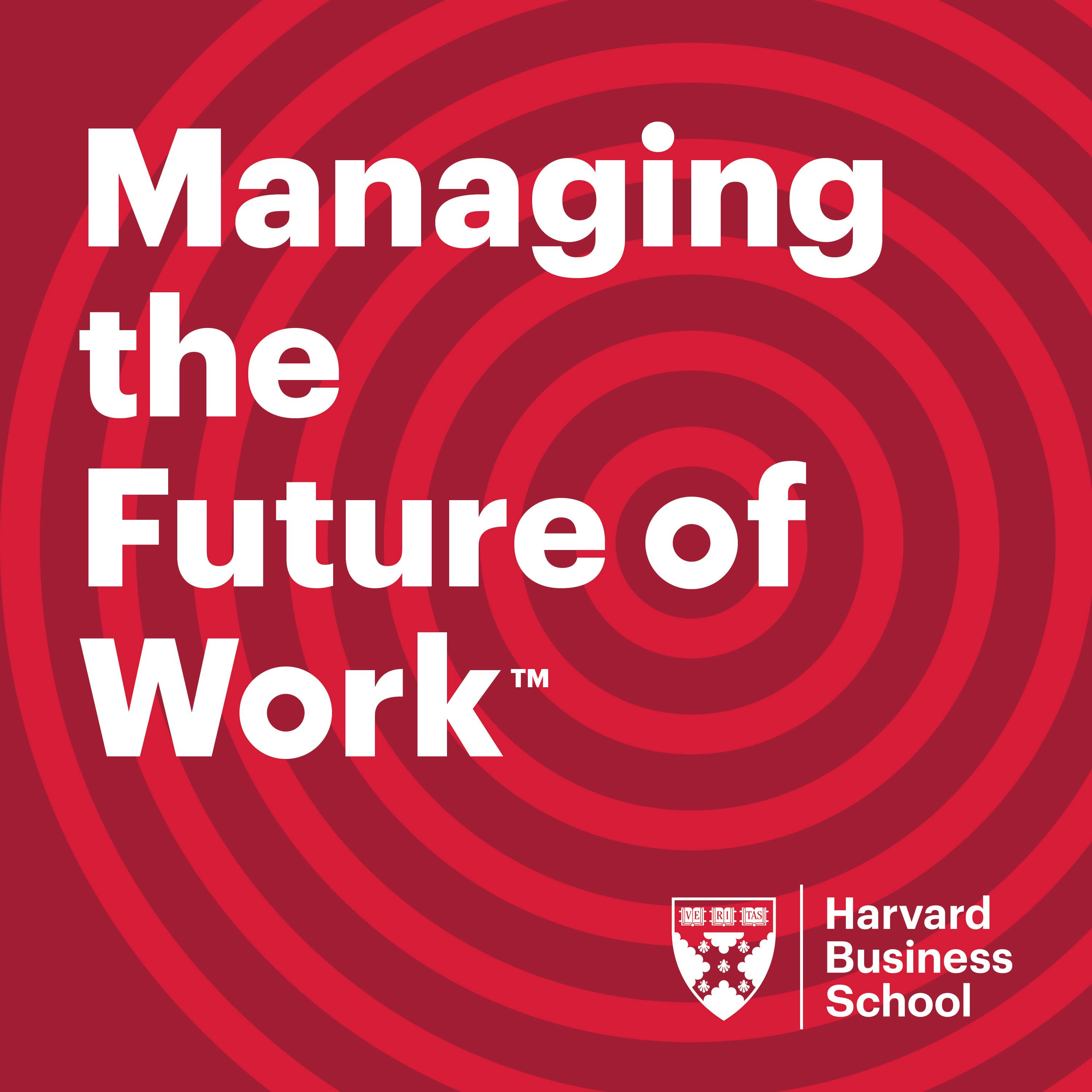

HBS Managing the Future of Work
Harvard Business School
Artificial intelligence. Robotics. The Gig Economy. Globalization. The world is changing at a dizzying pace in ways that will have a profound effect on the economy, jobs and the flow of talent. How will firms cope with the changes ahead and what steps do they need to take today? Each episode features faculty from the world’s leading business school interviewing CEOs, technologists and experts on the bleeding edge discussing how to survive and thrive by managing the future of work.
Episodes
Mentioned books

Jan 29, 2026 • 51min
HBS Project on Managing the Future of Work 2025 Year in Review, 2026 Preview
A fast-paced review of 2025 workforce disruptions and how AI began reshaping jobs and organizations. Discussion of skills-first hiring, occupational churn, and new tools mapping local training and jobs. Stories on gig work trends, hybrid AI adoption in firms, and community factors that shape mobility and opportunity.

8 snips
Jan 21, 2026 • 17min
HBS Skydeck: Can tech solve health care’s workforce crisis?
Lissy Hu, a physician and entrepreneur with an MD/MBA, founded Careport Health and now leads Ascend Learning. In a compelling discussion, she highlights how AI can combat healthcare labor shortages and enhance workforce training. Lissy explains the innovative Clare AI, providing personalized tutoring for students. She also shares insights on navigating M&A strategies to expand training solutions, discusses the critical role of soft skills in leadership, and reflects on the thrill of building strong teams in a rapidly changing industry.

Dec 17, 2025 • 38min
How HubSpot sells and supports its own AI transformation
Helen Russell, Chief People Officer at HubSpot, and John Dick, Chief Customer Success Officer, explore how HubSpot navigates its AI transformation. They discuss integrating AI into customer success to enhance workflows and the employee experience. Helen shares tactics for teaching AI fluency, emphasizing the importance of an explorer mindset. John highlights the collaboration between humans and AI as a power boost for customer interactions. The discussion also covers the evolving roles in a tech-driven workplace and the significance of ethics and privacy in AI use.

Dec 3, 2025 • 30min
Fiverr's Micha Kaufman on the post-AI gig economy
Micha Kaufman, Co-founder and CEO of Fiverr, shares insights on the evolving gig economy as influenced by AI. He highlights how AI is revolutionizing talent matching and organizational design while cautioning about its limitations. Kaufman discusses the rise of freelance work post-COVID and the emergence of new roles such as data labeling. He also emphasizes the importance of adapting to AI advancements to avoid displacement, envisions a future where AI enhances human talent, and shares practical leadership lessons in navigating change.

12 snips
Nov 19, 2025 • 36min
Wells Fargo's Bei Ling on culture change and learning agility
Bei Ling, Senior Vice President and Head of HR at Wells Fargo, brings her vast experience from top banks to discuss transformative culture change. She highlights the importance of restoring psychological safety and trust while navigating a turnaround. With a focus on talent strategy and AI integration, she emphasizes reskilling employees and adapting to a multigenerational workforce. Bei shares insights on attracting external talent and implementing responsible AI, showcasing innovative practices that align with the bank's growth ambitions.

Oct 29, 2025 • 1h 4min
Guest Episode: Joseph Fuller on the TechWolf podcast
The Managing the Future of Work co-chair and podcast co-host examines AI's implications for HR, spells out the competitive stakes in early adoption, and unpacks the technology's disruptive potential for jobs, organizations, and markets. Also, the rise of the CHRO, skills-based hiring, and more.

9 snips
Oct 15, 2025 • 32min
Reading and riding the AI wave: John Winsor on the value of flexibility
In this engaging discussion, John Winsor, a serial entrepreneur and Harvard Business School executive fellow, dives into the evolving world of work shaped by AI. He highlights how COVID accelerated the shift to freelancing and unbundled traditional jobs into flexible tasks. Winsor provides insights on why many AI initiatives falter and stresses the importance of leadership engagement. He also shares career advice for young graduates, emphasizing the value of curiosity and experimentation. Finally, he envisions a future filled with agile, entrepreneurial ventures enabled by AI.

Oct 1, 2025 • 33min
How web data is fueling the robot revolution
Bright Data's Or Lenchner on the evolving ground rules for harnessing
the web's data. Charting the boundaries of fair use in training AI systems and
robots. Also, the data gathering and analytics workforce.

Sep 17, 2025 • 35min
EY's Dan Diasio on consulting's AI challenge
How to get past AI fatigue and anxiety to a more expansive view of the technology's potential—bolstering knowledge work vs commoditizing expertise. As it guides organizations through the experimentation phase
and into redesigning business processes, the professional services giant is
undergoing an internal transformation.

Sep 4, 2025 • 35min
JFF's Maria Flynn on getting to good jobs
Maria Flynn, President and CEO of Jobs for the Future, leads the conversation on increasing job quality amid economic uncertainties. She highlights the need for equitable workforce development and the transformative role of AI in hiring. Emphasizing the distinction between job quantity and quality, Flynn advocates for pathways that provide access to quality jobs for all, especially marginalized communities. The discussion also touches on the importance of a bipartisan approach to tackling inequality and the urgency for education systems to adapt to future labor demands.


